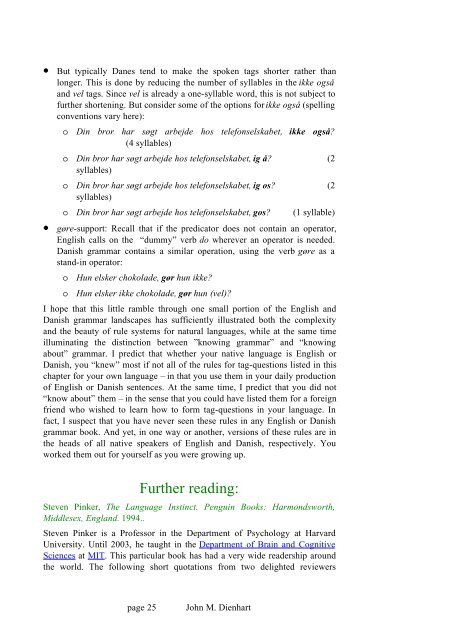Download - VISL
Download - VISL
Download - VISL
You also want an ePaper? Increase the reach of your titles
YUMPU automatically turns print PDFs into web optimized ePapers that Google loves.
• But typically Danes tend to make the spoken tags shorter rather than<br />
longer. This is done by reducing the number of syllables in the ikke også<br />
and vel tags. Since vel is already a one-syllable word, this is not subject to<br />
further shortening. But consider some of the options for ikke også (spelling<br />
conventions vary here):<br />
o<br />
Din bror har søgt arbejde hos telefonselskabet, ikke også?<br />
(4 syllables)<br />
o Din bror har søgt arbejde hos telefonselskabet, ig å? (2<br />
syllables)<br />
o Din bror har søgt arbejde hos telefonselskabet, ig os? (2<br />
syllables)<br />
o Din bror har søgt arbejde hos telefonselskabet, gos? (1 syllable)<br />
• gøre-support: Recall that if the predicator does not contain an operator,<br />
English calls on the “dummy” verb do wherever an operator is needed.<br />
Danish grammar contains a similar operation, using the verb gøre as a<br />
stand-in operator:<br />
o<br />
o<br />
Hun elsker chokolade, gør hun ikke?<br />
Hun elsker ikke chokolade, gør hun (vel)?<br />
I hope that this little ramble through one small portion of the English and<br />
Danish grammar landscapes has sufficiently illustrated both the complexity<br />
and the beauty of rule systems for natural languages, while at the same time<br />
illuminating the distinction between ”knowing grammar” and “knowing<br />
about” grammar. I predict that whether your native language is English or<br />
Danish, you “knew” most if not all of the rules for tag-questions listed in this<br />
chapter for your own language – in that you use them in your daily production<br />
of English or Danish sentences. At the same time, I predict that you did not<br />
“know about” them – in the sense that you could have listed them for a foreign<br />
friend who wished to learn how to form tag-questions in your language. In<br />
fact, I suspect that you have never seen these rules in any English or Danish<br />
grammar book. And yet, in one way or another, versions of these rules are in<br />
the heads of all native speakers of English and Danish, respectively. You<br />
worked them out for yourself as you were growing up.<br />
Further reading:<br />
Steven Pinker, The Language Instinct. Penguin Books: Harmondsworth,<br />
Middlesex, England. 1994..<br />
Steven Pinker is a Professor in the Department of Psychology at Harvard<br />
University. Until 2003, he taught in the Department of Brain and Cognitive<br />
Sciences at MIT. This particular book has had a very wide readership around<br />
the world. The following short quotations from two delighted reviewers<br />
page 25<br />
John M. Dienhart
















